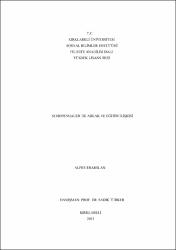| dc.contributor.author | Erarslan, Alper | |
| dc.date | 2019-04-09 | |
| dc.date.accessioned | 2019-04-10T11:26:20Z | |
| dc.date.available | 2019-04-10T11:26:20Z | |
| dc.date.issued | 2013-05-23 | |
| dc.identifier.citation | Erarslan, A. (2013). Schopenhauer ’de Ahlak Ve Eğitim İlişkisi. Yüksek Lisans Tezi. Kırklareli Üniversitesi Sosyal Bilimler Enstitüsü, Kırklareli. | |
| dc.identifier.uri | https://hdl.handle.net/20.500.11857/763 | |
| dc.description.abstract | Schopenhauer?in metafizik sisteminin temelinde yer alan isteme kavramı, Schopenhauer?de yalnızca bilgiyi ve varlığı değil; ahlakı ve eğitimi de açıklayan bir kavramdır. Schopenhauer, eğitim üzerine yazdığı yazılar ile eğitime katkıda bulunan filozoflar arasında yer alır. Schopenhauer?in klasik eğitim felsefelerine getirdiği eleştirilerin günümüz eğitim sistemi içinde tartışılması, eğitim sisteminin gelişimi açısından yararlı olacaktır. Bu inceleme de Schopenhauer?in bilgi ve ahlak felsefesi ışığında bireylere aktarılacak değerlerin ne olduğu ele alındıktan sonra, onun eğitim anlayışı ile klasik eğitim felsefeleri kısaca karşılaştırılmıştır. İncelememizin asıl amacı ise Schopenhauer?in eğitim anlayışını irdelemek ve bu anlayışa göre eğitim yoluyla bireyde meydana gelebilecek değişiklikleri ele almaktır. Schopenhauer?e göre eğitim karakter üzerinde bir değişiklik yaratmaz. Ona göre erdemler dil aracılığıyla öğretilemez. Bu sebeple insanın eğilimleri hep aynıdır. Eğitim yoluyla değişen yalnızca davranışlarımızdır. | |
| dc.description.abstract | The conception of will that is the basis for Schopenhauer?s metaphysics system, for Schopenhauer was not only a conception explaining cognition and being but also on morality and education. Schopenhauer, due to his published articles, is classed as a philosopher that contributes to education. The criticism that Schopenhauer made about classical education philosophies can be brought up for discussion in today?s education and used for relevant development. In the following research after discussing the transferable values to the individual by consideration of Schopenhauer?s epistemology and moral philosophies, his education comprehension and classical education philosophies has been compared in a summary. The main aim of our research is to examine Schopenhauer?s education comprehension and by this discuss the changes that result in the individual through their education. For Schopenhauer, education does not change character. For him moralities cannot be taught by language. Therefore human trends are all the same. The only thing that changes with education is behaviour. | |
| dc.language.iso | tur | |
| dc.publisher | Kırklareli Üniversitesi Sosyal Bilimler Enstitüsü | |
| dc.rights | info:eu-repo/semantics/openAccess | |
| dc.rights.uri | http://creativecommons.org/licenses/by-nc/3.0/us/ | * |
| dc.subject | Ahlak ve Eğitim | |
| dc.subject | Schopenhauer | |
| dc.title | Schopenhauer ’de Ahlak ve Eğitim İlişkisi | |
| dc.title.alternative | Relation of Morality and Education in Schopenhauer | |
| dc.type | masterThesis | |
| dc.department | [KLÜ] | |
| dc.relation.publicationcategory | Tez | |





















